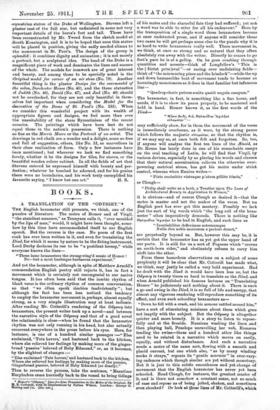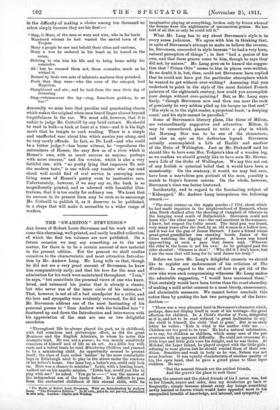BOOKS.
A TRANSLATION OF THE "ODYSSEY."* 'Tan English hexameter still presents, we think, one of the puzzles- of literature. The metre of Homer and of Virgil, " the stateliest measure," as Tennyson calls it, "ever moulded by the lips of man," would, it might have been thought, some- how by this time have accommodated itself to our English speech. But the reverse is the case. No poem of the first rank has ever been written in it, and even for translating the
Iliad, for which it seems by nature to be the fitting instrument, Lord Derby declares its use to be "a pestilent heresy," while everyone knows the lines—
"These lame hexameters the strong-wing'd music of Homer ! No—but a most burlesque barbarous experiment."
And yet the hexameter, although in spite of Matthew Arnold's -commendation English poetry still rejects it, has in fact a movement which is certainly not uncongenial to our native tongue. It has often been said that the iambic rhythm of blank verse is the ordinary rhythm of common conversation, so that "we Often speik ambles inadvertently "; but although the fact has been less noticed the tendency to employ the hexameter movement is, perhaps, almost equally strong, as a very simple illustration may at least indicate.
After reading Mr. Cotterill's rendering of the Odyssey into hexameters, the present writer took up a novel—and between the narrative style of the Odyssey and that of a good novel the relationship is close—when he found that the hexameter rhythm was not only running in his head, but also actually recurrent everywhere in the prose before his eyes. Here, for instance, is one of a hundred similar passages :—" Elsa exclaimed, Tuts havers,' and hastened back to the kitchen, where she relieved her feelings by making more of the ginger- bread 'pussies ' beloved of Baby Edmund," or, as it becomes, by the slightest of changes :- "Elsa exclaimed 'Tuts havers,' and hastened back to the kitchen, Where she relieved her feelings by making more of the pussies, Gingerbread pussies, beloved of Baby Edmund (so dearly)."
Then to reverse the process, take the sentence, "Meantime Eurylochus came hurriedly back to the vessel to bring tidings
Homer's "Odyssey," Line for-Line Translation in the Metre of the Original. By U. B. Cottorill, with 24 Illustrations by Patten Wilson. London: George G. Barrap and CO. 121s. net.]
of his mates and the shameful fate they had suffered ; yet not
a word was he able to utter for all his endeavour." Here by the transposition of a single word three hexameters become at once undetected prose, and if anyone will consider- these two cases he will get perhaps some clue to the puzzle why it is so hard to write hexameters really welL There movement is, we think, at once so strong and so natural that they often absolutely run away with the ii,riter. Directly he Ceases to go foot's pace he is at a gallop. On he goes crashing through quantities and accents—think of Longfellow's " This is the I forest prim leval "—or racing. over undulating fields— think of "the murmuring pines and the hemlock"—while the up and down hammerlike beat of movement tends to become as hauntingly monotonous as it does in that familiar but infamous line-
" Quadrupedante putrem Bonita quatit imp& campum."
The hexameter, in fact, is something like a fine horse, and needs, if it is to show its paces properly, to be mastered and held in hand. Homer knows it, as the first words of the Iliad--
" Mirtv ifei3o, ea, IIn.ktpacilice 'Axatilos
oicho,airov "-
may sufficiently show, for in them the movement of the verse is immediately overborne, as it were, by the strong pause which follows the majestic obAoeiree, so that the rhythm is, if we may say so, at once both felt and forgotten. So, too, if anyone will analyse the first ten lines of the 2Jneid, as Dr. Rouse has lately done in one of his remarkable essays on the oral teaching of Latin, he will find that Virgil, by various devices, especially by so placing his words and clauses that their natural accentuation relieves the otherwise over- powering metrical stress, has got his metre under strict control, whereas when Ennins writes-
" Poste reeximbite vestraque p5ctora pellite tensis," or Clough-
" Philip shall write us a book, a Treatise upon The Laws of
Architectural Beauty in Application to Women,"
it is obvious—and of course Clough so desired it—that the metre is master and not the maker of the verse. But no English poet has ever got this mastery. Possibly we lack just the sort of big words which "the long roll of thb hexa- meter" often imperatively demands. There is nothing like rinAneiSew'AX:aitos to be had in English, and such lines as
" Insatiabiliter dellevimus aeternumque Nulls, dies nobis moerorem e pectore demet," are perpetually beyond us. But, however this may be, it is certain that the hexameter has as yet got the upper hand of our poets. It is still for us a sort of Pegasus which " scorns an earth-born rider," and obstinately refuses to carry him aloft into the ether.
From these hazardous observations on a subject of some perplexity it will be clear that Mr. Cotterill has made what, we think, may justly be called a very bold experiment. Had be dealt with the Iliad it would have been less so, but the Odyssey is twenty times as hard to translate as the Iliad, and when Arnold published his famous lectures on " Translating Homer" he judiciously said nothing about it. There is-such a go and swing in the Iliad, it is so full of life and energy, that almost any vigorous rendering will reproduce something of its effect, and even such schoolboy hexameters as— "Down he fell with a crash, and his armour rattled around him," have a sort of stimulating noisiness about them which goes not inaptly with the subject. But the-Odyssey is altogether quieter and more homely. It is a story to listen to repose- fully -and at the fireside. Nausicaa washing the linen and then playing ball, Penelope unravelling her web, Eummus tending the swine—these and a hundred other like things need to be related in a narrative which moves on easily, equally, and 'without disturbance. And such a narrative needs a metre of the same sort, flowing with a smooth and placid current, but one which also, " as by many winding nooks it strays," repeats its "gentle murmur" in ever-vary- ing cadences which though similar are yet without monotony. But it is just to this subtle smoothness and yet change of movement that the English hexameter has never yet been schooled. Read Clough, for instance, the greatest master of it, and is there not somehow a constant sense, not so much of ease and repose as of being jolted, shaken, and sometimes even shocked ? Or look at these lines of Mr. Cotterill's, which in the difficulty of making a choice among ten thousand we select simply because they are his first :— "Sing, 0 Muse, of the man so wary and wise, who in far lands Wandered whenas he had wasted the sacred town of the Trojans.
Many a people he saw and beheld their cities and customs, Many a woe he endured in his heart as he tossed on the ocean,
Striving. to win him his life and to bring home safely his comrades.
Ah but he rescued them not, those comrades, much as he wished it.
Ruined by their own acts of infatuate madness they perished, Fools that they were—who the cows of the sun-god, lord Hyperion, Slaughtered and ate; and he took from the men their day of returning.
Sing—whence-ever the lay—sing, Zeus-born goddess, to us too !"
Assuredly we miss here that peculiar and penetrating charm which makes the original when once heard linger almost beyond forgetfulness in the ear. We must add, however, that it is unfair to judge Mr. Cotterill by any brief extract. He should be read in bulk—a book at least at a time—and it is his high
merit that he tempts to such reading. There is a simple and unaffected ease about him which carries you along, and
he very rarely offends. In fact, as Dr. Ledf—and who could be a better judge ?—has borne witness, be "reproduces the naturalness of Homer, the easy flow as of a river which is Homer's own, with as much success as anyone, perhaps with more success," and his version, which is also a very
faithful one, with "no pretty lying that improves To suit the modern taste," is one which any teacher who can read
aloud well would find" of real service in conveying some living sense of Homer's poetry even to inattentive ears. Unfortunately, however, if we may say so, the book is so magnificently printed, and so adorned with beautiful illus- trations, that it is too costly for ordinary use. We trust that its success in its present form may be such as to encourage Mr. Cotterill to publish it, as it deserves to be published, in a shape that will make it accessible to a wider range of readers.



















































 Previous page
Previous page